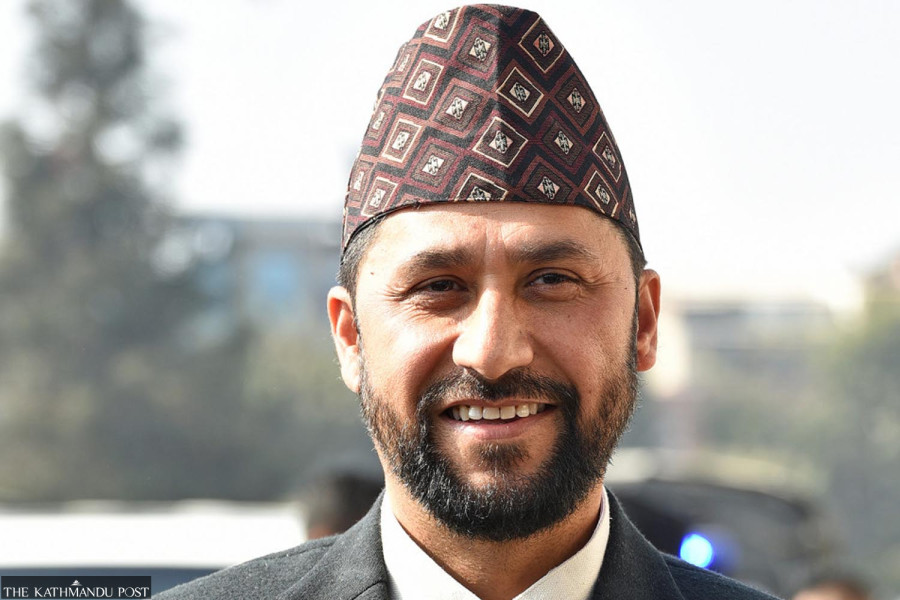National
Attorney General gives Rabi Lamichhane a clean chit
Nepal Police had held an inquest against the former deputy prime minister for holding dual passports and whether he had misused them.
Post Report
The Office of the Attorney General has given a clean chit to Rastriya Swatantra Party (RSP) chief Rabi Lamichhane in the case of possession of dual passports.
“As per the report submitted to the Nepal Police, the Office of the Attorney General has decided that there is no need to file a case against Lamichhane for holding dual passports of Nepal and the United States of America,” Joint Attorney General Sanjeevraj Regmi said.
As a complaint was filed against Lamichhane, the Nepal Police had held an inquest against the former deputy prime minister for holding dual passports and whether he had misused them.
But Nepal Police stated that since the old Nepali citizenship obtained by Lamichhane was already deactivated, there was no need to file a case. On the basis of his old citizenship, Lamichhane obtained his Nepali passport from the Nepali Embassy in Washington DC on May 27, 2015.
At the time of obtaining the Nepali passport, he possessed US citizenship. Lamichhane obtained US citizenship in 2014 and left the US in 2018. As per the Passport Act, an attempt to get a passport by providing false information, is a criminal offence. Lamichhane also obtained a US passport on March 5, 2014.
As per the documents, Lamichhane had applied for a Nepali passport after obtaining the American passport, but Regmi refused to comment on it.
While returning to Nepal in October 2017, he had applied to visit Nepal on a “relative’s visa” where he had mentioned his nationality as “American” citizen.
“It was not found that he had misused the Nepali passport obtained in 2015. He had also not used the Nepali passport while travelling abroad,” Regmi added.
As per the constitution of Nepal, the final authority lies with the office of the attorney general on whether to file a case in a matter that is against the government.
“The passport (08834838) that Lamichanne had obtained in 2015 from the Nepali Embassy in Washington DC, was not misused,” said Regmi, adding that his status was found to be of a non-Nepali resident.
There was a case filed in the Supreme Court about the validity of his citizenship and passports. But the Supreme Court in its verdict on March 8 stated that the case relating to Lamichhane obtaining a Nepali passport through an invalid citizenship document will be resolved in accordance with the law.
Lamichhane had in February 1994 acquired citizenship by descent from the District Administration Office, Kathmandu. Twenty years later, in 2014, he got an American citizenship. His Nepali citizenship was automatically scrapped the day he became an American citizen, according to the Citizenship Act.
Lamichhane returned to Nepal in 2014, the same year he acquired his American citizenship. After four years of his stay in Nepal, a complaint was lodged at the Press Council, saying that he was working in Nepal without a work permit.
A foreign national needs a work permit to work in Nepal. It was only after much criticism that Lamichhane renounced his American citizenship in May 2018, and its proof was presented to the Department of Immigration.
In between, he had acquired a Nepali passport by producing the Nepali citizenship he got in 1994 even before giving up his American citizenship. In its January 27 verdict, the court had said Lamichhane was ineligible to be a lawmaker because he didn’t have a Nepali citizenship. The verdict consequently cost him the posts of deputy prime minister and home minister. After renouncing his American citizenship, Lamichhane needed to re-apply for his Nepali citizenship, but he hadn’t done that.
As per law, one must be a Nepali citizen to enjoy political rights like forming a party or contesting elections.
“It is a must to re-acquire Nepali citizenship by following due legal process at the respective district administration office after giving up foreign citizenship in order to enjoy the political rights,” stated the verdict by a five-member constitutional bench led by the acting Chief Justice Hari Krishna Karki.
Lamichhane has already reacquired Nepali citizenship and is preparing to contest the by-election from Chitwan-2, which became vacant after the court invalidated his election as lawmaker. Lamichhane, however, can face a criminal charge if he is found to have simultaneously possessed passports of Nepal and the US.
Achyutamani Neupane, head of the Public Prosecutor's Office, Kathmandu, said that the police had given a report with the opinion that a case should not be proceeded against Lamichhane and sent it to the High Public Prosecutor's Office in Patan, for approval.
"With regard to the alleged misuse of the passport taken in 2015, records at the Immigration Department showed it was not found to have been misused," said Neupane. “The passport seems to have been surrendered, so there was no need to prosecute Lamichhane for passport offence.”
Section 21 of the Passport Act 2076 states that, if someone obtains or attempts to obtain a passport by giving false information, it is considered an offence. In point 'A' of the said section, it is mentioned that “if anyone obtains or attempts to obtain a passport or travel permit by giving false information, he shall be deemed to have committed an offence under this Act.”
According to sub-section 1 of section 22, those involved in this offence shall be punished with a fine ranging from Rs200,000 to Rs500,000 or imprisonment for a year and up to 3 years, or both. The Nepali law prohibits the use of dual citizenship.




 12.62°C Kathmandu
12.62°C Kathmandu













